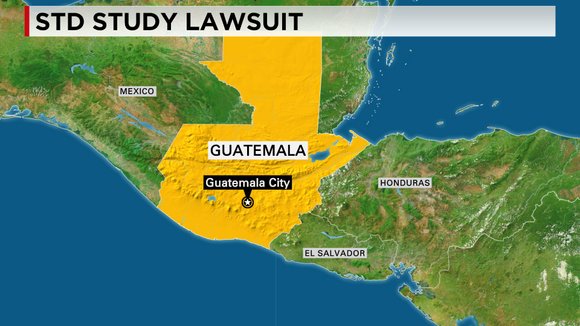(CNN) — Remember the Tuskegee syphilis experiment from the 1930s?
Scientists studied poor African-Americans in Alabama who’d contracted the venereal disease but didn’t tell them they had the disease or do anything to cure them.
A lawsuit filed this week alleges Johns Hopkins University and the Rockefeller Foundation helped conduct a similar study in Guatemala from 1945 to 1956.
Orphans, inmates, psychiatric patients and prostitutes were deliberately infected with sexually transmitted diseases to determine what drugs, including penicillin, worked best in stopping the diseases, the lawsuit says. The subjects of the experiments weren’t told they’d been infected, the lawsuit says, causing some to die and others to pass the disease to their spouses, sexual partners and children.
The suit seeks more than $1 billion in damages and has 774 plaintiffs, including people who were subjects in the experiments and their descendants.
This is the second attempt to collect damages. In 2012, a class-action federal lawsuit was filed against the U.S. government over the Guatemala experiments conducted by the U.S. Public Health Service. A judge dismissed it, saying the Guatemalans could not sue the United States for grievances that happened overseas. The new lawsuit was filed in the Baltimore City Circuit Court.
Johns Hopkins and the Rockefeller Foundation filed statements on their websites condemning the experiments, but denying responsibility.
“The plaintiffs’ essential claim in this case is that prominent Johns Hopkins faculty members’ participation on a government committee that reviewed funding applications was tantamount to conducting the research itself and that therefore Johns Hopkins should be held liable,” the Johns Hopkins statement said. “Neither assertion is true.”
The lawsuit alleges the Rockefeller Foundation funded Johns Hopkins’ research into public health issues, including venereal disease, and employed scientists who monitored the Guatemala experiments.
The lawsuit, the Rockefeller Foundation statement said, “seeks improperly to assign ‘guilt by association’ in the absence of compensation from the United States federal government.”
The suit says Johns Hopkins and the Rockefeller Foundation designed, supported and benefited from the Guatemala experiments.
Bristol-Myers Squibb pharmaceutical group and that company’s owner, Mead Johnson, also are defendants. The pharmaceutical company supplied drugs for the experiments, the suit says.
On Saturday, a spokeswoman for Bristol-Myers Squibb sent this statement to CNN: “We’ve only just received the complaint in this matter. Bristol-Myers Squibb played an important role in the development of penicillin in the past and today we continue to focus our work on developing breakthrough medicines for serious disease. As a company dedicated to patients, we take this matter very seriously and are reviewing the allegations.”
Nobody doubts the experiments happened.
In 2010, then-Secretary of State Hillary Clinton apologized to Guatemala for the experiments, saying they were “clearly unethical.”
In the 1930s and 1940s, the government followed a policy of funding scientific medical research but not controlling individual doctors, the suit says. The lawsuit says John Hopkins controlled and influenced the appointed panels that authorized funding for research into venereal disease.
The lawsuit says prostitutes were infected to intentionally spread the disease and that syphilis spirochetes were injected into the spinal fluid of subjects. A woman in a psychiatric hospital had gonorrhea pus from a male subject injected into both her eyes, the suit says.
The lawsuit doesn’t say why the experiments ended. The results were never published and were not revealed until 2011, when the Presidential Commission for the Study of Bioethical Issues wrote a letter to President Barack Obama telling of its investigation, the suit says.
CNN’s Deanna Hackney contributed to this report.
